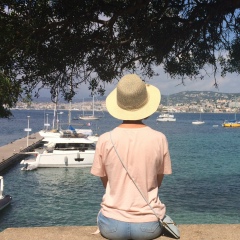В известном фильме Никиты Михалкова «Утомлённые солнцем» в самом конце есть такой эпизод: главного героя, комдива Котова, везут в чёрном воронке в НКВД, а он (ещё, видимо, не до конца понимая серьёзность своего положения) напевает известную песню тех времён: «Нас утро встречает прохладой, нас ветром встречает река...» Через несколько минут он будет жестоко избит своими конвоирами, а случайного свидетеля этого происшествия расстреляют.
Фильм я смотрел давно, но песенку запомнил — видимо, из-за жуткого сочетания солнечного оптимизма с угрюмой обстановкой в НКВД-шной машине. (Песня, кстати, называется «Песня о встречном» — немного странное название, не правда ли?)
Мало ли я слышал советских песен 30-х годов? Много, но эта оказалась довольно привязчивой — и даже спустя много лет я могу воспроизвести её мотив.
Видимо, причина в том, что её автор (как я узнал на прошлой неделе) — Дмитрий Шостакович. Композитору тогда было всего 26 лет, и он очень хотел написать шедевр, который будут распевать и насвистывать все
советские люди, даже уезжая на верную смерть.
Этот тяжёлый контраст советской жизни вскоре настиг самого Шостаковича — после разгромной статьи, опубликованной в газете «Правда» в 1936 году, Шостакович ожидал ареста. В недавно вышедшей книжке Джулиана Барнса “The Noise of Time” — можно назвать её художественным переложением биографии Шостаковича — это показано особенно хорошо.
Действие первой части сконцентрировано на одной ночи, которую Шостакович проводит в ожидании ареста на площадке около своей квартиры. Внезапно оживает лифт; он проезжает несколько этажей и останавливается напротив Шостаковича.
He picked up his case, the doors opened, and a man he didn't know came out whistling “The Song of the Counterplan”. Faced with its composer, he broke off in mid-phrase.
/Он уже схватился за свой чемоданчик, двери открылись, и из лифта вышел человек, насвистывая «Песню о встречном». Встретившись взглядом с композитором, он оборвал песню на полуслове/
Смешно, но именно после прочтения этого отрывка на английском я осознал, что в «Песне о встречном» имеется в виду встречный план — давно забытое понятие советской плановой экономики 30-х годов, элемент «социалистического соревнования». То, что было понятно каждому современнику Шостаковича, сейчас забылось. И даже название песни, которая до сих пор на слуху, уже требует расшифровки.
Фильм я смотрел давно, но песенку запомнил — видимо, из-за жуткого сочетания солнечного оптимизма с угрюмой обстановкой в НКВД-шной машине. (Песня, кстати, называется «Песня о встречном» — немного странное название, не правда ли?)
Мало ли я слышал советских песен 30-х годов? Много, но эта оказалась довольно привязчивой — и даже спустя много лет я могу воспроизвести её мотив.
Видимо, причина в том, что её автор (как я узнал на прошлой неделе) — Дмитрий Шостакович. Композитору тогда было всего 26 лет, и он очень хотел написать шедевр, который будут распевать и насвистывать все
советские люди, даже уезжая на верную смерть.
Этот тяжёлый контраст советской жизни вскоре настиг самого Шостаковича — после разгромной статьи, опубликованной в газете «Правда» в 1936 году, Шостакович ожидал ареста. В недавно вышедшей книжке Джулиана Барнса “The Noise of Time” — можно назвать её художественным переложением биографии Шостаковича — это показано особенно хорошо.
Действие первой части сконцентрировано на одной ночи, которую Шостакович проводит в ожидании ареста на площадке около своей квартиры. Внезапно оживает лифт; он проезжает несколько этажей и останавливается напротив Шостаковича.
He picked up his case, the doors opened, and a man he didn't know came out whistling “The Song of the Counterplan”. Faced with its composer, he broke off in mid-phrase.
/Он уже схватился за свой чемоданчик, двери открылись, и из лифта вышел человек, насвистывая «Песню о встречном». Встретившись взглядом с композитором, он оборвал песню на полуслове/
Смешно, но именно после прочтения этого отрывка на английском я осознал, что в «Песне о встречном» имеется в виду встречный план — давно забытое понятие советской плановой экономики 30-х годов, элемент «социалистического соревнования». То, что было понятно каждому современнику Шостаковича, сейчас забылось. И даже название песни, которая до сих пор на слуху, уже требует расшифровки.
In the famous film “Burnt by the Sun” by Nikita Mikhalkov, at the very end there is such an episode: the main character, commander Kotov, is taken in a black funnel to the NKVD, and he (apparently still not fully understanding the seriousness of his situation) sings a famous song of those times: “We are greeted in the morning with coolness, we are greeted by the river with the wind ...” In a few minutes he will be brutally beaten by his escorts, and an accidental witness of this incident will be shot.
I watched the film for a long time, but I remembered the song - apparently, because of the terrible combination of solar optimism with the gloomy atmosphere in the NKVD-shnoy car. (The song, by the way, is called "Song of the Oncoming" - a bit of a strange name, isn't it?)
Did I hear Soviet songs of the 30s? Many, but this one turned out to be rather affectionate - and even after many years I can reproduce her motive.
Apparently, the reason is that its author (as I found out last week) is Dmitry Shostakovich. The composer was then only 26 years old, and he really wanted to write a masterpiece that everyone would sing and whistle
Soviet people, even leaving for certain death.
This heavy contrast of Soviet life soon overtook Shostakovich himself - after a devastating article published in the newspaper Pravda in 1936, Shostakovich was awaiting arrest. In the recently published book by Julian Barnes “The Noise of Time” - you can call it the artistic arrangement of Shostakovich’s biography - this is shown especially well.
The action of the first part is concentrated on one night, which Shostakovich spends in anticipation of an arrest on the site near his apartment. The elevator suddenly comes to life; he passes several floors and stops opposite Shostakovich.
He picked up his case, the doors opened, and a man he didn't know came out whistling “The Song of the Counterplan”. Faced with its composer, he broke off in mid-phrase.
/ He already grabbed his suitcase, the doors opened, and a man stepped out of the elevator, whistling "Song of the Counter." Met his gaze with the composer, he broke off the song at a glance /
It is ridiculous, but it was after reading this passage in English that I realized that the “Song of the Counter” refers to the counter plan — the long-forgotten concept of the Soviet planned economy of the 30s, an element of “socialist competition”. What was clear to every contemporary of Shostakovich is now forgotten. And even the name of the song, which is still on hearing, already requires decryption.
I watched the film for a long time, but I remembered the song - apparently, because of the terrible combination of solar optimism with the gloomy atmosphere in the NKVD-shnoy car. (The song, by the way, is called "Song of the Oncoming" - a bit of a strange name, isn't it?)
Did I hear Soviet songs of the 30s? Many, but this one turned out to be rather affectionate - and even after many years I can reproduce her motive.
Apparently, the reason is that its author (as I found out last week) is Dmitry Shostakovich. The composer was then only 26 years old, and he really wanted to write a masterpiece that everyone would sing and whistle
Soviet people, even leaving for certain death.
This heavy contrast of Soviet life soon overtook Shostakovich himself - after a devastating article published in the newspaper Pravda in 1936, Shostakovich was awaiting arrest. In the recently published book by Julian Barnes “The Noise of Time” - you can call it the artistic arrangement of Shostakovich’s biography - this is shown especially well.
The action of the first part is concentrated on one night, which Shostakovich spends in anticipation of an arrest on the site near his apartment. The elevator suddenly comes to life; he passes several floors and stops opposite Shostakovich.
He picked up his case, the doors opened, and a man he didn't know came out whistling “The Song of the Counterplan”. Faced with its composer, he broke off in mid-phrase.
/ He already grabbed his suitcase, the doors opened, and a man stepped out of the elevator, whistling "Song of the Counter." Met his gaze with the composer, he broke off the song at a glance /
It is ridiculous, but it was after reading this passage in English that I realized that the “Song of the Counter” refers to the counter plan — the long-forgotten concept of the Soviet planned economy of the 30s, an element of “socialist competition”. What was clear to every contemporary of Shostakovich is now forgotten. And even the name of the song, which is still on hearing, already requires decryption.
У записи 38 лайков,
2 репостов.
2 репостов.
Эту запись оставил(а) на своей стене Игорь Шендерович

























































